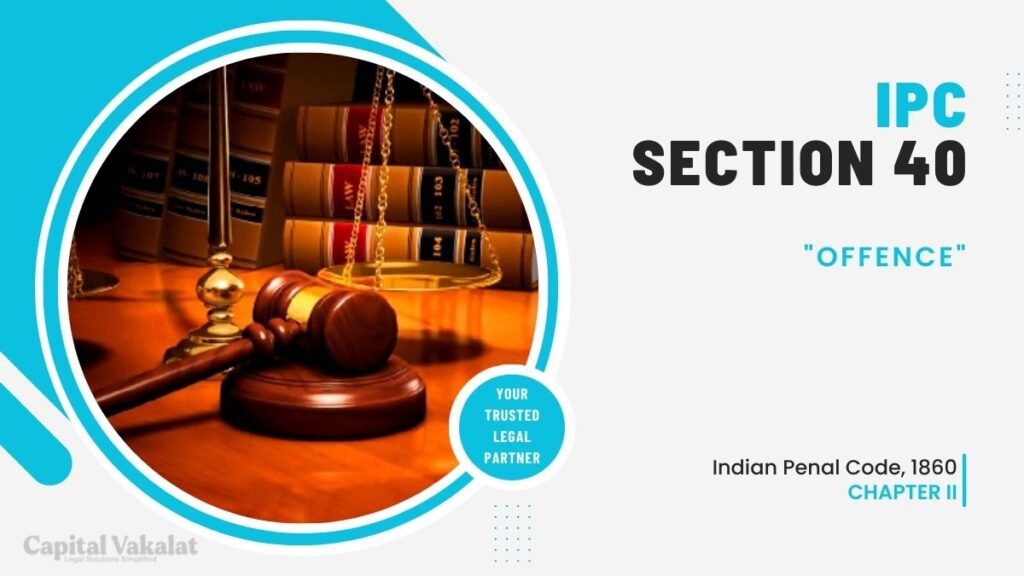In the realm of legal frameworks, Section 40 of the Indian Penal Code (IPC) holds a significant place as it delves into the intricacies of what constitutes an “offence.” This provision is crucial in defining the parameters of criminal acts and plays a pivotal role in the criminal justice system of India. Let’s embark on a comprehensive journey to grasp the essence of Section 40 IPC and its implications.

Section 40 IPC serves as a foundational pillar in the Indian Penal Code, 1860. It elucidates the term “offence” and its essential components, forming the basis for legal actions against individuals engaged in criminal behavior.
The Definition of “Offence”
An offence, as outlined in Section 40 IPC, encompasses any act or omission that violates the law and is punishable by the state. This section forms the cornerstone for the legal interpretation of what constitutes an offence, guiding legal practitioners and judges alike.
Elements of an Offence
Actus Reus
The actus reus, or the guilty act, is a fundamental element of any offence. It refers to the physical action or conduct that constitutes the crime. Without a demonstrable actus reus, an offence cannot be established.
Mens Rea
Mens rea delves into the mental state of the offender. It pertains to the intent or knowledge behind the act committed. Establishing mens rea is crucial to differentiate between intentional criminal acts and accidental actions.
Classification of Offences
Offences are broadly categorized into felonies and misdemeanors, each carrying distinct levels of punishment. Additionally, offences can be classified as compoundable and non-compoundable, influencing the possibility of reconciliation between the parties involved.
Felonies
Felonies are grave offences that usually involve severe punishments, such as imprisonment for over a year or even life imprisonment. Murder and rape are examples of felonies.
Misdemeanors
Misdemeanors are less serious offences that generally result in lighter penalties, such as fines or imprisonment for less than a year. Petty theft is an example of a misdemeanor.
Compoundable Offences
Compoundable offences allow the victim to withdraw the case with the consent of the court, often involving private disputes.
Non-Compoundable Offences
Non-compoundable offences are more serious in nature and cannot be resolved through compromise. They are treated as offences against the state.
Cognizable and Non-Cognizable Offences
Offences are also categorized as cognizable and non-cognizable based on whether a police officer can make an arrest without a warrant. Cognizable offences are more serious and grant the police broader powers.
Punishments for Offences
The IPC prescribes varying degrees of punishment for different offences. These can range from fines to imprisonment, and in extreme cases, even the death penalty.
Importance of Section 40 IPC
Section 40 IPC lays the groundwork for the entire legal edifice of offences. It provides the necessary definitions and principles that enable fair and just legal proceedings.
Evolution of the Concept of Offence
The notion of what constitutes an offence has evolved over time, reflecting changes in societal norms, values, and legal philosophies.
Legal Proceedings and Offences
Legal proceedings against offences involve intricate steps, from investigation to trial. Due process and the presumption of innocence are paramount throughout.
Landmark Cases
Several landmark legal cases have shaped the interpretation and application of Section 40 IPC, setting precedents for future rulings.
Safeguarding Individual Rights
It’s essential to strike a balance between punishing offenders and safeguarding the rights of individuals accused of committing offences.
Role of Legal Professionals
Legal professionals, including judges, lawyers, and law enforcement, play a crucial role in upholding the integrity of the justice system.
Public vs. Private Offences
Offences are often categorized as public or private, depending on whether they harm society at large or specific individuals.
Social Implications
The legal definition and classification of offences have far-reaching social implications, influencing behavior and morality within society.
Conclusion
In conclusion, Section 40 IPC forms the bedrock of the Indian Penal Code, providing the framework to understand, classify, and penalize offences. Its intricate details, encompassing actus reus, mens rea, and various classifications, ensure a just and equitable legal system.
Certainly, here are some external resources for further details on Section 40 IPC and related topics:
- Indian Penal Code, 1860: Access the full text of the Indian Penal Code, including Section 40 and related provisions.
- Understanding Actus Reus and Mens Rea: A comprehensive article explaining the concepts of actus reus and mens rea in criminal law.
- Types of Offences: Felonies and Misdemeanors: Learn about the differences between felonies and misdemeanors and their implications in legal proceedings.
- Cognizable and Non-Cognizable Offences: A detailed overview of cognizable and non-cognizable offences and their significance in the Indian legal system.
- Compoundable and Non-Compoundable Offences: Understand the distinctions between compoundable and non-compoundable offences and their resolution methods.
These resources offer in-depth insights into various aspects of Section 40 IPC and related legal concepts. Access them to enhance your understanding of this important legal provision.
FAQs
How are offences classified?
Offences are classified as felonies and misdemeanors, along with compoundable and non-compoundable offences.
What is the role of mens rea in criminal cases?
Mens rea examines the intent behind a criminal act, differentiating between intentional and unintentional actions.
Can a non-compoundable offence be settled outside of court?
No, non-compoundable offences are considered offences against the state and cannot be resolved through compromise.
What is the relationship between offences and societal norms?
Offences often reflect the prevailing societal norms and values, showcasing the evolving nature of legal definitions.